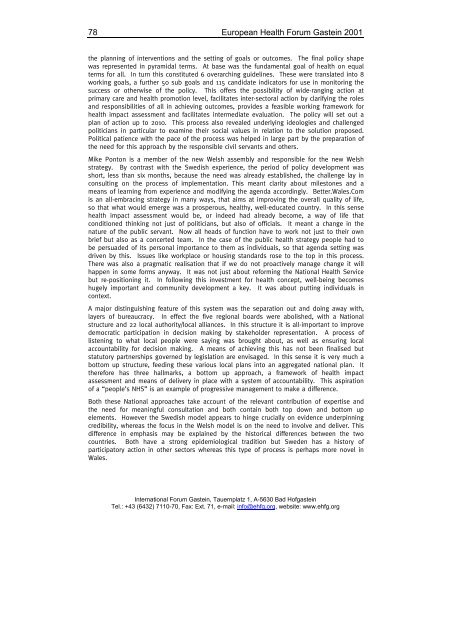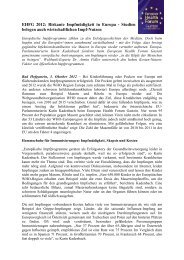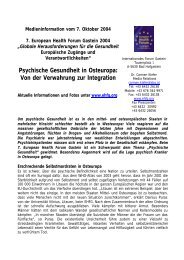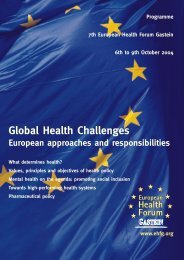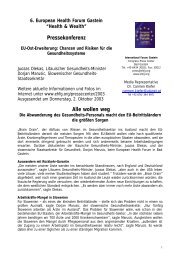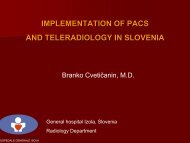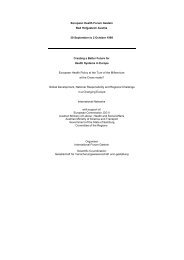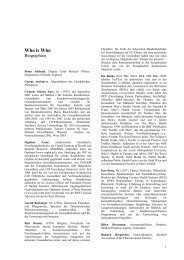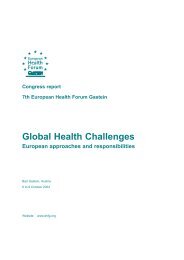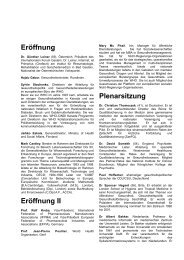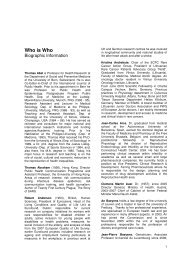Congress report - European Health Forum Gastein
Congress report - European Health Forum Gastein
Congress report - European Health Forum Gastein
Create successful ePaper yourself
Turn your PDF publications into a flip-book with our unique Google optimized e-Paper software.
78<br />
<strong>European</strong> <strong>Health</strong> <strong>Forum</strong> <strong>Gastein</strong> 2001<br />
the planning of interventions and the setting of goals or outcomes. The final policy shape<br />
was represented in pyramidal terms. At base was the fundamental goal of health on equal<br />
terms for all. In turn this constituted 6 overarching guidelines. These were translated into 8<br />
working goals, a further 50 sub goals and 115 candidate indicators for use in monitoring the<br />
success or otherwise of the policy. This offers the possibility of wide-ranging action at<br />
primary care and health promotion level, facilitates inter-sectoral action by clarifying the roles<br />
and responsibilities of all in achieving outcomes, provides a feasible working framework for<br />
health impact assessment and facilitates intermediate evaluation. The policy will set out a<br />
plan of action up to 2010. This process also revealed underlying ideologies and challenged<br />
politicians in particular to examine their social values in relation to the solution proposed.<br />
Political patience with the pace of the process was helped in large part by the preparation of<br />
the need for this approach by the responsible civil servants and others.<br />
Mike Ponton is a member of the new Welsh assembly and responsible for the new Welsh<br />
strategy. By contrast with the Swedish experience, the period of policy development was<br />
short, less than six months, because the need was already established, the challenge lay in<br />
consulting on the process of implementation. This meant clarity about milestones and a<br />
means of learning from experience and modifying the agenda accordingly. Better.Wales.Com<br />
is an all-embracing strategy in many ways, that aims at improving the overall quality of life,<br />
so that what would emerge was a prosperous, healthy, well-educated country. In this sense<br />
health impact assessment would be, or indeed had already become, a way of life that<br />
conditioned thinking not just of politicians, but also of officials. It meant a change in the<br />
nature of the public servant. Now all heads of function have to work not just to their own<br />
brief but also as a concerted team. In the case of the public health strategy people had to<br />
be persuaded of its personal importance to them as individuals, so that agenda setting was<br />
driven by this. Issues like workplace or housing standards rose to the top in this process.<br />
There was also a pragmatic realisation that if we do not proactively manage change it will<br />
happen in some forms anyway. It was not just about reforming the National <strong>Health</strong> Service<br />
but re-positioning it. In following this investment for health concept, well-being becomes<br />
hugely important and community development a key. It was about putting individuals in<br />
context.<br />
A major distinguishing feature of this system was the separation out and doing away with,<br />
layers of bureaucracy. In effect the five regional boards were abolished, with a National<br />
structure and 22 local authority/local alliances. In this structure it is all-important to improve<br />
democratic participation in decision making by stakeholder representation. A process of<br />
listening to what local people were saying was brought about, as well as ensuring local<br />
accountability for decision making. A means of achieving this has not been finalised but<br />
statutory partnerships governed by legislation are envisaged. In this sense it is very much a<br />
bottom up structure, feeding these various local plans into an aggregated national plan. It<br />
therefore has three hallmarks, a bottom up approach, a framework of health impact<br />
assessment and means of delivery in place with a system of accountability. This aspiration<br />
of a “people’s NHS” is an example of progressive management to make a difference.<br />
Both these National approaches take account of the relevant contribution of expertise and<br />
the need for meaningful consultation and both contain both top down and bottom up<br />
elements. However the Swedish model appears to hinge crucially on evidence underpinning<br />
credibility, whereas the focus in the Welsh model is on the need to involve and deliver. This<br />
difference in emphasis may be explained by the historical differences between the two<br />
countries. Both have a strong epidemiological tradition but Sweden has a history of<br />
participatory action in other sectors whereas this type of process is perhaps more novel in<br />
Wales.<br />
International <strong>Forum</strong> <strong>Gastein</strong>, Tauernplatz 1, A-5630 Bad Hofgastein<br />
Tel.: +43 (6432) 7110-70, Fax: Ext. 71, e-mail: info@ehfg.org, website: www.ehfg.org


